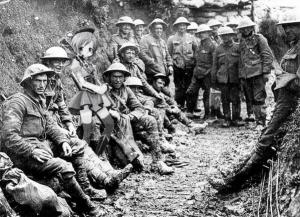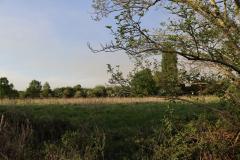
1916 was a cruel year when some of the problems that affect us today began to emerge. February, however, was not cursed for Wilmslow as no local fatalities were reported. This was in spite of the fact that the Cheshires were involved in all theatres of war.
Some were involved in the loss and recapture of the high ground of the Bluff (spoil heap) in the Ypres Salient. They were among the many local men on the Western Front (1st/5th, 1st/6th, 1st/7th and the Bantams of the 15th/16th). All the men in this last group were below the British Army's regulation height of 5'3" and Birkenhead, Cheshire was the first such battalion to be raised in the country. Some lads had travelled from Gallipoli (now abandoned) to Salonika (12th) to fight the Bulgarians and others to Mesopotamia to confront the Turks (8th). Many guarded the coasts of the Home Front - 3rd at the Mersey, 2/5th at Lowestoft. As the month progressed the Cheshire contingent of Kitchener's New Army of 1914 volunteers arrived in France and Belgium (9th, 10th, 11th, 13th) for the first time.
Meanwhile, on 21st February German heavy artillery opened up the most bloody, confined and lengthy battle of the Great War at Verdun in north eastern France. The German Chief of Staff, Erich von Falkenhayn believed the only hope of victory on the Western Front was through a war of attrition on one member of the Entente and so humiliate them that they would sue for peace. France was to be bled dry. He chose to attack the citadel of Verdun in a salient of the Meuse surrounded by 20 forts. He thought France would fight to the last man to defend these mystical icons and chillingly calculated they would lose 5 Frenchmen for every 2 Germans.
He wanted to kill not capture ground. Verdun was pounded. Philippe Petain, appointed by Joffre to defend "at all costs" was a master of stubbornness and logistics and he rotated 80% of the French army into the salient via the "Voie Sacree" - a 40 mile road from Verdun to Bas le Duc. Truckloads of troops and supplies passed along here every 15 seconds day and night.
This battle was to have a serious impact on our armed forces. To take pressure off the beleaguered French, the British brought forward their planned attack on the unpromising battlefield of the Somme. Fighting in July instead of August/September, our relatively untrained, raw battalions were thrown in too early. We lost 19,240 dead on the first day, 1st July, including 6 from Wilmslow alone. The Germans, however, were forced to divert divisions north and the French were eventually able to resume the offensive under Robert Nivelle. At the end of 1916 all forts were recovered and nearly all ground regained. By the end of the battle on 20th December, the French had suffered 377,000 casualties (162,000 killed) and the Germans 337,000 casualties (140,000 killed) - one death per minute night and day. Verdun was thus a Pyrrhic victory for the French.
In the 1920s and 30s Verdun and the Battle of the Somme became bywords for the futility and illogicality of war and the incompetence of some commanders. Pacifism understandably became a mainstream movement in the interwar period in France and Britain. Interestingly A J P Taylor, the popular historian and broadcaster, who was at the University of Manchester from 1930 to 1938 and lived at Disley, Cheshire, was a prominent member of the Manchester Peace Council. He was a frequent public speaker in this area. Initially an opponent of rearmament however, he resigned in 1936 and became a fervent opponent of appeasement.
Jon Armstrong and Alan Cooper
Wilmslow Historical Society









